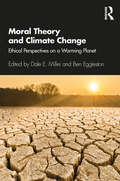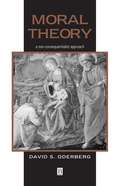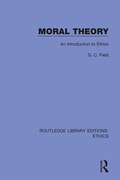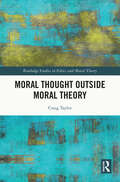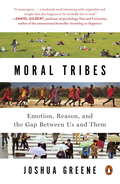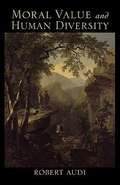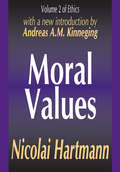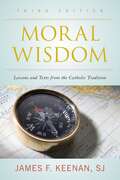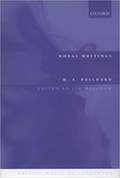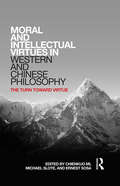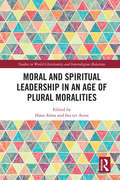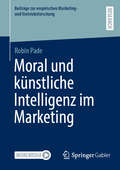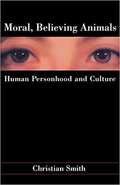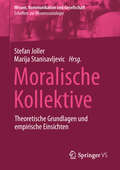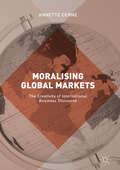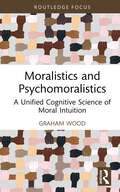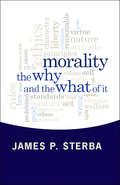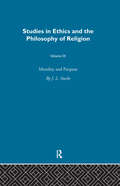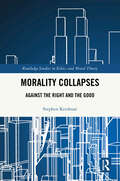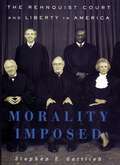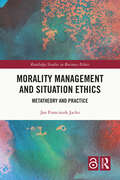- Table View
- List View
Moral Theory and Climate Change: Ethical Perspectives on a Warming Planet
by Dale E. Miller Ben EgglestonClimate change has become the most pressing moral and political problem of our time. Ethical theories help us think clearly and more fully about important moral and political issues. And yet, to date, there have been no books that have brought together a broad range of ethical theories to apply them systematically to the problems of climate change. This volume fills that deep need. Two preliminary chapters—an up-to-date synopsis of climate science and an overview of the ethical issues raised by climate change—set the stage. After this, ten leading ethicists in ten separate chapters each present a major ethical theory (or, more broadly, perspective) and discuss the implications of that view for how we decide to respond to a rapidly warming planet. Each chapter first provides a brief exposition of the view before working out what that theory “has to say” about climate change and our response to the problems it poses. Key features: • Up-to-date synopsis of climate science • Clear overviews of a wide range of ethical theories and perspectives by leading experts • Insightful discussions of the implications of these theories and perspectives for our response to climate change • A unique opportunity to assess the relative strengths and weaknesses of various ethical viewpoints.
Moral Theory: A Non-Consequentialist Approach
by David S. OderbergThe book sets out the basic system used to solve moral problems, the system that consequentialists deride as 'traditional morality'. The central concepts, principles and distinctions of traditional morality are explained and defended.
Moral Theory: An Introduction to Ethics
by G. C. FieldOriginally published in 1921, updated in 1932 and re-issued in 1966 with an introduction by Stephan Körner, this book remains a classic introduction to the study of ethics. It clearly explains both the Aristotelian and the Kantian approach to ethical problems, by combining the advantages of a historical and systematic introduction. Much of the book is devoted to Aristotle and Kant, whose moral theories are important and who are influential forces in contemporary moral philosophy.
Moral Thought Outside Moral Theory (Routledge Studies in Ethics and Moral Theory)
by Craig TaylorThis book argues there can be no theory of ethics and that any attempt at such a theory ends up distorting the moral phenomena that it is supposed to explain. It presents clear examples of moral thought outside moral theorising through literature and Wittgenstein’s later philosophy. The book’s precise target is moral theory understood as a theory of right action. The author begins by arguing against the assumption central to moral theory that moral judgments are universalizable; that what it is right for one agent to do in a given situation is what is right for any agent in that same situation. Rather, moral judgments are essentially first personal. The author's specific contention here is that our understanding of moral thought in literature provides grounds for rejecting the assumption that moral judgments are universalizable. The author then goes on to argue that there is some determinate and objective content to ethics connected to recognising another human being as a limit to our will. He presents several literary examples that have influenced his thinking about the nature of moral value. He combines these readings with insights from Wittgenstein’s later writings to demonstrate the ways in which moral theorising fails to capture important aspects of moral thought. Moral Thought Outside Moral Theory will be of interest to scholars and advanced students working in ethics and moral theory, literature and philosophy, and Wittgenstein.
Moral Tribes
by Joshua GreeneOur brains were designed for tribal life, for getting along with a select group of others (Us), and for fighting off everyone else (Them). But modern life has thrust the world's tribes into a shared space, creating conflicts of interest and clashes of values, along with unprecedented opportunities. As the world shrinks, the moral lines that divide us become more salient and more puzzling. We fight over everything from tax codes to gay marriage to global warming, and we wonder where, if at all, we can find our common ground. . . A grand synthesis of neuroscience, psychology, and philosophy, 'Moral Tribes' reveals the underlying causes of modern conflict and lights a way forward. Our emotions make us social animals, turning Me into Us. But they also make us tribal animals, turning Us against Them. Our tribal emotions make us fight, sometimes with bombs, sometimes with words, and often with life-and-death stakes. Drawing inspiration from moral philosophy and cutting-edge science, 'Moral Tribes' shows when we should trust our instincts, when we should reason, and how the right kind of reasoning can move us forward. . . Joshua Greene is the director of Harvard University's Moral Cognition Lab, a pioneering scientist, a philosopher, and an acclaimed teacher. The great challenge of 'Moral Tribes' is this: How can we get along with Them when what they want feels so wrong? Finally, Greene offers a surprisingly simple set of maxims for navigating the modern moral terrain, a practical road map for solving problems and living better lives.
Moral Tribes
by Joshua GreeneThe Boston Globe"Surprising and remarkable... Toggling between big ideas, technical details, and his personal intellectual journey, Greene writes a thesis suitable to both airplane reading and PhD seminars."Our brains were designed for tribal life, for getting along with a select group of others (Us) and for fighting off everyone else (Them). But modern times have forced the world's tribes into a shared space, resulting in epic clashes of values along with unprecedented opportunities. As the world shrinks, the moral lines that divide us become more salient and more puzzling. We fight over everything from tax codes to gay marriage to global warming, and we wonder where, if at all, we can find our common ground.A grand synthesis of neuroscience, psychology, and philosophy, Moral Tribes reveals the underlying causes of modern conflict and lights the way forward. Greene compares the human brain to a dual-mode camera, with point-and-shoot automatic settings ("portrait," "landscape") as well as a manual mode. Our point-and-shoot settings are our emotions--efficient, automated programs honed by evolution, culture, and personal experience. The brain's manual mode is its capacity for deliberate reasoning, which makes our thinking flexible. Point-and-shoot emotions make us social animals, turning Me into Us. But they also make us tribal animals, turning Us against Them. Our tribal emotions make us fight--sometimes with bombs, sometimes with words--often with life-and-death stakes.An award-winning teacher and scientist, Greene directs Harvard University's Moral Cognition Lab, which uses cutting-edge neuroscience and cognitive techniques to understand how people really make moral decisions. Combining insights from the lab with lessons from decades of social science and centuries of philosophy, the great question of Moral Tribes is this: How can we get along with Them when what they want feels so wrong to Us?Ultimately, Greene offers a set of maxims for navigating the modern moral terrain, a practical road map for solving problems and living better lives. Moral Tribes shows us when to trust our instincts, when to reason, and how the right kind of reasoning can move us forward.A major achievement from a rising star in a new scientific field, Moral Tribes will refashion your deepest beliefs about how moral thinking works and how it can work better.
Moral Value and Human Diversity
by Robert AudiAre there ethical standards that deserve everyone's allegiance? Can judgments of value transcend taste and cultural preference? Moral Value and Human Diversity offers a brief but highly comprehensive introduction to ethics and value theory that argues for positive answers in a pluralistic framework.
Moral Values (Ethics Ser.)
by Nicolai HartmannNicolai Hartmann (1882-1950), along with Henri Bergson and Martin Heidegger, was instrumental in restoring metaphysics to the study of philosophy. Unlike his contemporaries, however, Hartmann was clearly influenced by Plato. His tour-de-force, Ethik, published in English in 1932 as Ethics, may be the most outstanding work on moral philosophy produced in the twentieth century.In the first part of Ethics (Moral Phenomena), Hartmann was concerned with the structure of ethical phenomena, and criticized utilitarianism, Kantianism, and relativism as misleading approaches. In the second part, Moral Values, the author describes all values as forming a complex and as yet imperfectly known system. The actualization of the non-moral and elementary moral values is a necessary condition for the actualization of the higher values. It is on this account that rudimentary values have a prior claim.Hartmann outlines the main features of the chief virtues, and shows that the moral disposition required in any exigency is always a specific synthesis of various and often conflicting values. Specifically describing fundamental moral values-such as goodness, nobility, and vitality-and special moral values-such as justice, wisdom, courage, self-control, trustworthiness, and modesty-Hartmann takes theoretical philosophy and brings it very much into the realm of the practical.A compelling and insightful volume, Moral Values remains an essential contribution to the moral and ethical literature of the twentieth century. Hartmann offers a self-contained system of ethics that yet offers a conservative outlook on social life.
Moral Wisdom: Lessons and Texts from the Catholic Tradition
by James F. Keenan SjThis book introduces readers to moral theory through a Catholic lens. In a warm, conversational style, Father Keenan shares a wealth of stories and examples to highlight the resources in the Catholic tradition for developing moral wisdom. Connecting formative influences of the Catholic heritage with themes of love, consciences, sin, and suffering, the book helps readers appreciate what gives meaning to our lives. The third edition has been revised throughout to help the reader better understand how to develop and apply moral wisdom in real life. It features additional examples, as well as new material on the teachings of Pope Francis. Chapters on the Ten Commandments and the teachings of Jesus have been re-worked in light of new scholarship. The book also features a new final chapter, Moral Agency, which addresses making practical decisions based on the lessons and texts from the book. Each chapter includes study questions to help readers further reflect on key themes.
Moral Writings
by H. A. Prichard Jim MacAdamThis is the definitive collection of the ethical work of the great Oxford moral philosopher H. A. Prichard (1871-1947). Prichard is famous for his ethical intuitionism: he argued that moral obligation cannot be reduced to anything else, but is perceived by direct intuition. The essays previously included in the posthumous collection Moral Obligation are now augmented by a selection of previously unpublished writings from Prichard's manuscripts, allowing for the first time a full view of his distinctive contribution to moral philosophy, at just the time when intuitionism is enjoying a revival of interest.
Moral and Intellectual Virtues in Practices: Through the Eyes of Scientists and Musicians
by Darcia Narvaez Mark Graves Timothy Reilly Keke Kaikhosroshvili Stefanie Israel de SouzaThis book provides an integrative interdisciplinary view of how intellectual and moral virtues are understood in two separate practices, science and music. The authors engage with philosophical and psychological accounts of virtue to understand scientists’ and musicians’ understandings of intellectual and moral virtues. They present empirical evidence substantiating the MacIntyrean claim that traditions and practices are central to understanding the virtues."
Moral and Intellectual Virtues in Western and Chinese Philosophy: The Turn toward Virtue
by Ernest Sosa Michael Slote Chienkuo MiThis is the first book to bring together Western and Chinese perspectives on both moral and intellectual virtues. Editors Chienkuo Mi, Michael Slote, and Ernest Sosa have assembled some of the world’s leading epistemologists and ethicists—located in the U.S., Europe, and Asia—to explore in a global context what they are calling, "the virtue turn." The 15 chapters have never been published previously and by covering topics that bridge epistemology and moral philosophy suggest a widespread philosophical turn away from Kantian and Utilitarian issues and towards character- and agent-based concerns. A goal of this volume is to show students and researchers alike that the (re-)turn toward virtue underway in the Western tradition is being followed by a similar (re-)turn toward virtue in Chinese philosophy.
Moral and Spiritual Leadership in an Age of Plural Moralities (Studies in World Christianity and Interreligious Relations)
by Ina Ter Avest Hans AlmaIn crisis situations, such as terror attacks or societal tensions caused by migration, people tend to look for explicit moral and spiritual leadership and are often inclined to vote for so-called 'strong leaders'. Is there a way to resist the temptation of the simplistic solutions that these ‘strong leader’ offer, and instead encourage constructive engagement with the complex demands of our times? This volume utilises relational and dialogical perspectives to examine and address many of the issues surrounding the moral and spiritual guidance articulated in globalizing Western societies. The essays in this collection focus on the concept of plural moralities, understood as divergent visions on what is a 'good life', both in an ethical, aesthetical, existential, and spiritual sense. They explore the political-cultural context and consequences of plural moralities as well as discussing challenges, possibilities, risks, and dangers from the perspective of two promising relational theories: social constructionism and dialogical self theory. The overarching argument is that it is possible to constructively put in nuanced moral and spiritual guidance into complex, plural societies. By choosing a clear theoretical focus on relational approaches to societal challenges, this interdisciplinary book provides both a broad scope and a coherent argument. It will be of great interest to scholars of social and political psychology, leadership and organization, religious studies, and pedagogy.
Moral und künstliche Intelligenz im Marketing (Beiträge zur empirischen Marketing- und Vertriebsforschung)
by Robin PadeKonsumentendaten lassen sich zunehmend effektiv mit künstlicher Intelligenz (KI) kombinieren, um die Online Journey kalkuliert zu beeinflussen. Dieses Buch befasst sich anhand dreier Forschungsarbeiten mit den Fragen wann Marketing-KI Konsumentenentscheidungen vielmehr manipuliert als bereichert und wie Marketing-KI infolgedessen moralischer gestaltet werden kann. Die erste Forschungsarbeit untersucht, inwieweit Manipulationswahrnehmungen vom Menschenbild des Konsumenten abhängen. Hierfür werden zwei Studien mit 1.151 Teilnehmern durchgeführt. Daran anknüpfend stellt sich die Frage, ob Manager Konsumentenbilder auf opportunistische Weise instrumentalisieren, um Marketingaktivitäten zu legitimieren. Die zweite Forschungsarbeit kombiniert daher Methoden der Ökonometrie und des Natural Language Processing, um Menschenbilder von Managern aus Textdaten (33.407 Earnings Call Transkripte) zu analysieren. Die dritte Forschungsarbeit möchte Marketing-KI moralischer gestalten. Hierfür werden neuronale Netze mithilfe psychografischer Daten von 762 Teilnehmern trainiert, um faire personalisierte Preise anzubieten und Reaktionen mittels Laborexperiment (203 Probanden) zu untersuchen.
Moral, Believing Animals: Human Personhood and Culture
by Christian SmithWhat kind of animals are human beings? And how do our visions of the human shape our theories of social action and institutions? InMoral, Believing Animals, Christian Smith advances a creative theory of human persons and culture that offers innovative, challenging answers to these and other fundamental questions in sociological, cultural, and religious theory. Smith suggests that human beings have a peculiar set of capacities and proclivities that distinguishes them significantly from other animals on this planet. Despite the vast differences in humanity between cultures and across history, no matter how differently people narrate their lives and histories, there remains an underlying structure of human personhood that helps to order human culture, history, and narration. Drawing on important recent insights in moral philosophy, epistemology, and narrative studies, Smith argues that humans are animals who have an inescapable moral and spiritual dimension. They cannot avoid a fundamental moral orientation in life and this, says Smith, has profound consequences for how sociology must study human beings.
Moralische Kollektive: Theoretische Grundlagen und empirische Einsichten (Wissen, Kommunikation und Gesellschaft)
by Stefan Joller Marija StanisavljevicOb Terroranschläge, Flüchtlings- oder Finanzkrisen – die Herausforderungen der globalisierten Moderne legen jene Bereiche frei, die Durkheim als anomisch bezeichnete und deren Bearbeitung nach wie vor die zentrale Stellung moralischer Kommunikation verdeutlicht. Einiges spricht dafür, dass die fortschreitende funktionale Differenzierung die Moral nicht erodieren lässt, sondern durch die zunehmende kommunikative Vernetzung geradezu eine Remoralisierung der Gesellschaft befördert. Überall dort, wo Missstände zu Tage treten und nicht abzusehen ist, wie diese im modus operandi befriedigend gelöst werden könnten, gibt die Moral ein verheißungsvolles Instrument zur Hand, das in Gestalt moralischer Kollektive den Alltag zu durchdringen und die Gesellschaft zu formen vermag. Der Sammelband widmet sich in diesem Sinne einer sowohl theoretischen wie auch empirischen Analyse der Moral, die als genuin soziale Größe über moralische Kollektive Form annimmt.
Moralising Global Markets: The Creativity of International Business Discourse
by Annette CerneInvestigating how international market actors create market morality on a global level, this book reflects on the unresolved questions and debates regarding the relationship between business and society. The author explores how market actors in international business communication are unified in their attempts to make markets moralised. Providing detailed case studies and empirical evidence based on interviews with practitioners, Moralising Global Markets is a useful read for anyone interested in international business, and for those researching morality, ethics and corporate social responsibility.
Moralistics and Psychomoralistics: A Unified Cognitive Science of Moral Intuition (Routledge Focus on Philosophy)
by Graham WoodThis book brings together three distinct research programs in moral psychology – Moral Foundations Theory, Cognitive Adaptations for Social Exchange and the Linguistic Analogy in Moral Psychology – and shows that they can be combined to create a unified cognitive science of moral intuition. The book assumes evolution has furnished the human mind with two types of judgement: intuitive and deliberative. Focusing on moral intuitions (understood as moral judgments that were not arrived at via a process of conscious deliberation), the book explores the origins of these intuitions, examines how they are produced, and explains why the moral intuitions of different humans differ. Providing a unique synthesis of three separate established fields, this book presents a new research program that will further our understanding of the various different intuitive moral judgements at the heart of some of the moral tensions within human society.
Morality
by James P. SterbaThis collection of essays examines what morality requires of us and why we should even be moral. They are organized around Sterba's opening essay, which attempts to answer these questions by first of all arguing that we must be moral because we are rationally compelled, but by also advancing a number of positions from a libertarian perspective about egotism and altruism, negative liberty, welfare and equality. Each of essays not written by Sterba critiques a facet of his argument. They focus mostly on the rational underpinning of morality; moral skepticism; egotism, altruism and social cooperation; and how libertarianism does not lead to welfare and equality. Sterba responds to these critiques in a final essay. The other authors are professors of philosophy with specialties in moral thinking. Annotation ©2012 Book News, Inc. , Portland, OR (booknews. com)
Morality
by James P. SterbaThis book invites philosophers and their students to consider two of the most fundamental questions in moral and political philosophy: Why be moral? And, what does morality require? Distinguished philosopher James P. Sterba presents his unique views on these topics. Sterba first argues from rationality to morality and then from morality to substantial equality. Prominent scholars Charles W. Mills, Candace A. Vogler, Anita Superson, Russ Shafer-Landau, Allan F. Gibbard, Gerald Gaus, and Tibor Machan provide thought-provoking critical responses. In the final part, Sterba addresses these critiques, inviting readers to explore the various arguments and reach their own conclusions on these fundamental questions of moral and political philosophy. Morality: The Why and What of It is an essential text for all students and scholars of ethics and political philosophy.
Morality
by James P. SterbaThis book invites philosophers and their students to consider two of the most fundamental questions in moral and political philosophy: Why be moral? And, what does morality require? Distinguished philosopher James P. Sterba presents his unique views on these topics. Sterba first argues from rationality to morality and then from morality to substantial equality. Prominent scholars Charles W. Mills, Candace A. Vogler, Anita Superson, Russ Shafer-Landau, Allan F. Gibbard, Gerald Gaus, and Tibor Machan provide thought-provoking critical responses. In the final part, Sterba addresses these critiques, inviting readers to explore the various arguments and reach their own conclusions on these fundamental questions of moral and political philosophy. Morality: The Why and What of It is an essential text for all students and scholars of ethics and political philosophy.
Morality & Purpose Vol 9
by J. L. StocksFirst published in 2003. Routledge is an imprint of Taylor & Francis, an informa company.
Morality Collapses: Against the Right and the Good (Routledge Studies in Ethics and Moral Theory)
by Stephen KershnarThis book argues that consequentialism and non-consequentialism are false because they face metaphysical and intuitional problems. The two theories exhaust the theories of the right, so there is no rightness.This result matters because it requires us to give up widely held beliefs regarding knowledge, moral responsibility, and reasons for action. The author’s argument is unique because it focuses on applied-ethical arguments rather than metaethical issues. Specifically, it avoids metaethical discussions of whether morality explains our thoughts and actions, how we know about morality, and whether the denial of morality is self-defeating. The author specifically argues against consequentialism and non-consequentialism in the following ways: Metaphysical Problems: Consequentialism and non-consequentialism are false because they need a theory of counterfactuals and backtracking that they cannot have Rights Problems: Non-consequentialism is false because non-consequentialism depends on rights, and people do not have rights. They do not have rights because of problems regarding moral responsibility, right-grounding, and self-ownership Circularity: Non-consequentialism is false because the basic building blocks of non-consequentialism—desert, rights, and virtue—are circular Morality Collapses will be of interest to researchers and graduate students working in normative ethics, metaethics, moral responsibility, and political philosophy.
Morality Imposed: The Rehnquist Court and the State of Liberty in America
by Stephen E. GottliebWe like to think of judges and justices as making decisions based on the facts and the law. But to what extent do jurists decide cases in accordance with their own preexisting philosophy of law, and what specific ideological assumptions account for their decisions? Stephen E. Gottlieb adopts a unique perspective on the decision-making of Supreme Court justices, blending and re-characterizing traditional accounts of political philosophy in a way that plausibly explains many of the justices' voting patterns. A seminal study of the Rehnquist Court, Morality Imposed illustrates how, in contrast to previous courts which took their mandate to be a move toward a freer and/or happier society, the current court evidences little concern for this goal, focusing instead on thinly veiled moral judgments. Delineating a fault line between liberal and conservative justices on the Rehnquist Court, Gottlieb suggests that conservative justices have rejected the basic principles that informed post-New Deal individual rights jurisprudence and have substituted their own conceptions of moral character for these fundamental principles. Morality Imposed adds substantially to our understanding of the Supreme Court, its most recent cases, and the evolution of judicial philosophy in the U.S.
Morality Management and Situation Ethics: Metatheory and Practice (Routledge Studies in Business Ethics)
by Jan Franciszek JackoThis book presents the philosophical assumptions of situation ethics to show the practice of morality management that follows from them. This research comprises theoretical and applied aspects: It is an investigation into metaethics that encompasses strategic and quality management problems. With the example of situation ethics, the book illustrates the role of philosophical investigations and solutions in management theory and practice. It will be of interest to researchers, academics and advanced students in the fields of business and management studies, ethics, quality management and philosophy. Furthermore, this book may be useful for senior executives and politicians charged with negotiating complicated moral quandaries and overseeing the implementation of ethical policies in their organisations and communities.
